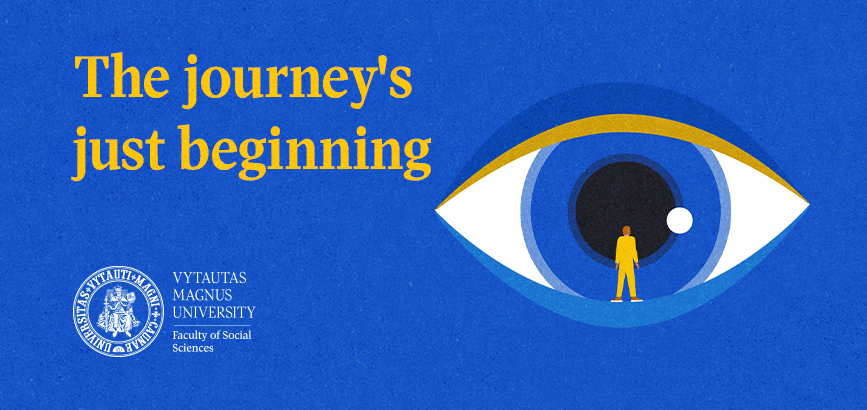International Research Symposium UNK/VMU

We invite everyone interested in psychological research and discussions among psychologists to the traditional International Video Conference “Current Research in Psychology: International Experience”.
Students, doctoral students, lecturers and researchers of psychology programs of Vytautas Magnus University and University of Nebraska at Kearney (USA) will participate in the conference and give presentations. The conference language is English.
WHEN? May 7, 2025 from 4 p.m.
WHERE? ZOOM: https://unk.zoom.us/j/97437559389 (Passcode: 585954)
You are cordially invited to participate!
Opening of the VMU Psychology Clinic’s psychologist’s office in Vilnius

PhD Student Princess Thembisile Sibanda: VMU Has Made Commendable Efforts to Support Students with Diverse Needs
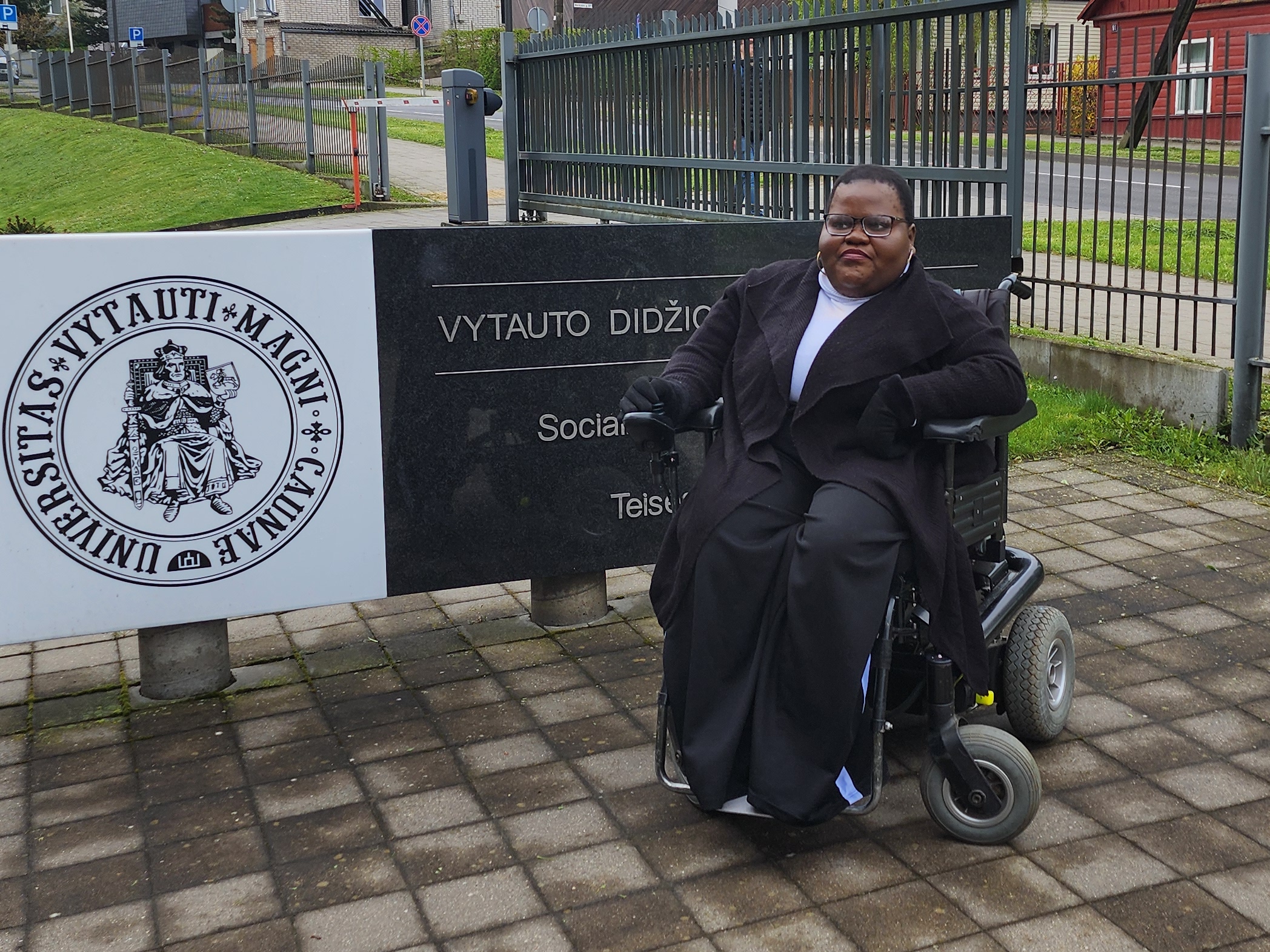
“Lithuania has a unique blend of history, culture, and modernity. This country’s culture was fascinating to experience. The people I met were kind and welcoming, though cultural interactions sometimes felt more reserved compared to the social dynamics I’m used to in South Africa”, says Princess Thembisile Sibanda, PhD student from the University of Pretoria (South Africa) who visited Vytautas Magnus University (VMU) as a participant of the Erasmus exchange program during her master’s degree studies.
The doctoral student, who has a physical disability, is very proactive: she is not only preparing her dissertation in the field of psychology but also works as a radio presenter and takes part in various social initiatives dedicated to the promotion of diversity and inclusion. Sibanda explains that she chose Lithuania and VMU for her visit because of its strong academic culture, international outlook and the opportunity to experience a different research environment; additionally, she was curious about Lithuania’s cultural heritage and cuisine.
“I visited Vilnius, Trakai, and Kaunas. The highlight of my travels was Trakai Island; it was breathtaking! I got to be on a boat for the first time, which was an incredible experience. The views from Gediminas’ Castle in Vilnius were also spectacular, offering a panoramic look at the city’s historical beauty. I was excited to try Lithuanian cuisine, especially the infamous pink soup (šaltibarščiai). It was a unique experience! Lithuanian food was very different from what I’m used to”, the PhD student reveals.
Inclusive and International University
As a student with a disability, Princess Thembisile Sibanda expressed appreciation of VMU’s work in ensuring that studies and research are accessible to all students. VMU is the first higher education institution in Lithuania that started focusing on social inclusion of persons with disabilities through higher education. Today, the university is prioritising adaptation of studies in accordance with individual needs: not just physical or other disabilities but also psychological and emotional wellbeing, helping the students plan their studies and deal with personal efficiency, motivation, and other matters. Students are provided assistance in various areas by mentors and the Student Well-Being Coordinator. VMU has declared 2025 to be The Year of Student Well-Being and has launched a new mentoring program, “Peer-to-Peer”.
“VMU has made commendable efforts to support students with diverse needs. The university staff were helpful and accommodating, I appreciated the willingness of faculty and staff to assist wherever possible. Further investment in accessibility infrastructure would enhance inclusivity even more”, Sibanda notes.

Princess Thembisile Sibanda
In the PhD student’s words, VMU gave her a warm welcome and provided a supportive environment for independent research. She particularly liked the high degree of autonomy she was granted here, while at the same time receiving valuable guidance. Princess Thembisile Sibanda is especially thankful to the Head of Dept. of Psychology at VMU Faculty of Social Sciences, Assoc. Prof. Gabija Jarašiūnaitė-Fedosejeva.
“Compared to South African universities, I found the research environment at VMU to be more flexible. Another key difference is the internationalisation at VMU. The university has a strong global outlook and fosters engagement between students from diverse backgrounds”, she points out, adding that even though South African universities also have international partnerships, she was fond of VMU’s uniquely immersive atmosphere in a smaller academic community.
Discussions on Liberal Arts Left a Deep Impression
While visiting Lithuania in 2024, Princess Thembisile Sibanda was still an MA student working on her final master’s research work (dissertation), which is a requirement for Academic Masters in Psychology at the University of Pretoria. It focused on the lived experiences of sexually diverse Black South African people with disabilities. She chose this topic because it focused on a critically under-represented and marginalised group whose voices have often been excluded from both academic discourse and mainstream social narratives.
“In South Africa, despite having progressive legal frameworks supporting LGBTQ+ rights and disability inclusion, individuals at the intersection of these identities—particularly Black South Africans—have continued to face layered discrimination, social invisibility, and structural exclusion. By exploring their lived experiences through a qualitative lens, my aim was to highlight their daily challenges while contributing to the growing body of intersectional research and to advocate for more inclusive, empathetic social, policy, and institutional responses”, she explains.
This year, as a PhD candidate, Princess Thembisile Sibanda is working on her doctoral dissertation, whose topic was directly inspired by her visit at VMU, particularly the international academic forum The Idea of University which was dedicated to the 35th reestablishment anniversary of VMU. At the forum, various experts from all over the world discussed the transformations of the concept of university as well as the significance of the liberal arts (artes liberales) principles on which the VMU study system is based.
“It was during this engaging event that my research interest was ignited, as the discussions on curriculum transformation, interdisciplinarity, and the future of liberal education in a rapidly evolving world resonated deeply with my academic and personal aspirations”, reveals Sibanda.
Her PhD dissertation explores how the psychology curricula of South African universities integrate psychological knowledge and liberal education principles to prepare graduates for Society 5.0. The latter concept, created by the Japanese government in 2016, describes a new type of society which integrates advanced technologies such as AI across various sectors and areas of everyday life.

Princess Thembisile Sibanda
Work in Radio is Inspiring and Meaningful
The doctoral student also works as a presenter at Skills Village Radio, which devotes special attention to the rights, inclusion, and awareness of persons with disabilities. In her show, Sibanda not only investigates various issues related to these topics but also interviews disability advocates, mental health professionals, or people with lived experience. According to her, this is a meaningful and fulfilling job that also requires creativity, e.g. when writing scripts, curating music or audio segments, and promoting the show on social media.
“What’s truly enjoyable about this work is the opportunity to give a voice to under-represented communities, spark important conversations, and educate the public. It’s empowering to know the show can make someone feel seen, heard, and informed”, she says, admitting that it is not easy to balance this job with her PhD studies. However, the two roles do complement one another well: radio provides a break from academic intensity, and the PhD provides depth and insight into radio topics.
Princess Thembisile Sibanda is delighted by the opportunities provided by the Erasmus exchange program, which allows students to travel and get acquainted with foreign universities and cultures. The South African researcher, who spent three and a half months in Lithuania under Erasmus, confesses that she finds Lithuania to be an attractive country for life and work, especially in the academic field. Sibanda particularly enjoyed the country’s research environment, international collaborations, and the opportunities for growth in higher education.
Sharing her advice with students who are considering participation in Erasmus, Sibanda says that, first of all, it’s important to plan everything as early as possible, to find out all the requirements, and to engage with the university staff on all concerning matters. She also encourages students to try out new things, immerse themselves in a new culture and discover the local customs.
„Be open to independence: exchange programs, especially research-based ones, require self-discipline and proactive engagement. On the other hand, do network with students and academics – building connections can open doors for future collaborations and career opportunities”, she says, reminding everyone, especially the students with accessibility requirements, to advocate for their needs and communicate them early.
Erasmus+ Traineeship Competition

The competition for Erasmus+ students or recent graduates traineeship in EU/EEA is now open! The application deadline is April 30, 2025.
(Application period for EU/EEA countries is OPEN every month!)
The placement period is from 2 to 4 months. Recent graduate traineeship must end – a year after graduation.
Note! For recent graduate traineeship applications must be submitted and students must be selected while the applicant is still a student at VMU.
You can only apply for one traineeship place – multiple mobilities are not possible.
Selection
All VMU full-time degree students who have not used more than 10 months of their Erasmus+ mobility (study/traineeship) period are eligible for the Erasmus+ grant.
Selection documents (Documents must be submitted online):
For student traineeship (traineeship during student’s year of studies):
- Filled-in application form „Outgoing-Application for Erasmus Student Traineeship“ (must select EN language to find the form).
- Confirmation by the company or organization (obligatory).
For recent graduate traineeship (application must be submitted during the last year of studies):
- Application form „Outgoing-Application for Erasmus Recent Graduate Traineeship “ (must select EN language to find the form).
- Confirmation by the company or organization (obligatory);
- Recommendation by a faculty member (obligatory).
The priority in the selection is given to:
- students whom traineeship is an obligatory part of their study programme;
- students who have never been Erasmus traineeship students before.
Selection criteria:
- student’s motivation;
- good knowledge of the language which will be used during the traineeship;
- student’s work, study, traineeship, participation in international/academic projects, and social activities experience in Lithuania and abroad;
- conformability between the chosen traineeship and the student’s study programme;
- study results (first-year MA students should attach a transcript of records of their BA/MA degree to the application form).
Traineeship grants
For EU and EEA countries:
| Country group | Country | Monthly scholarship size |
| Group I | Ireland, Austria, Belgium, Denmark, Iceland, Italy, Liechtenstein, Luxembourg, Netherlands, Norway, France, Finland, Sweden, Germany. | 824,00 Eur |
| Group II | Czech Republic, Estonia, Greece, Spain, Latvia, Cyprus, Malta, Portugal, Slovakia, Slovenia. | 824,00 Eur |
| Group III | Bulgaria, Croatia, Lithuania, Poland, Hungary, Romania, Serbia, North Macedonia, Turkey. | 756,00 Eur |
For Non-EU/EEA countries: Competition is over. Next competition will be held in September.
The scholarship is 700,00 Eur/month + travel scholarship.
13 and 14 region countries scholarship is 824,00 Eur/month + travel scholarship.
Region 13: Andorra, Monaco, San Marino, Vatican City State.
Region 14: Faroe Islands, Switzerland, United Kingdom.
Additional travel scholarship (the size is determined by the distance* from Lithuania (Kaunas city) to the location (city) of the practice organization) can be calculated by Erasmus+ Distance Calculator.
| Travel distance | Ecological travel (total): | Non-ecological travel (total): |
| 10-99 km | 56 EUR | 28 EUR |
| 100-499 km | 285 EUR | 211 EUR |
| 500-1999 km | 417 EUR | 309 EUR |
| 2000-2999 km | 535 EUR | 395 EUR |
| 3000-3999 km | 785 EUR | 580 EUR |
| 4000-7999 km | 1 1188 EUR | 1 188 EUR |
| 8000 km or more | 1 735 EUR | 1 735 EUR |
Note: travels up to 500 km. must be ecological travels! It means traveling by bus, train, car, etc. Otherwise, you will need to submit a form with the reason why you chose to travel non-ecological.
The competition results will be sent to every participant via e-mail.
Note: Application results are published next month (10-11th of the upcoming month), therefore, the traineeship start date should be at least two weeks after that day. The competition results will be published via e-mail.
More information:
Traineeships programme coordinator Marius Mikalauskas
Address: V. Putvinskio str. 23, room 207.
Phone: +370 37 788 149
Email: Marius.Mikalauskas@vdu.lt
Exhibition THE SUN, THE MOON, AND ALL THE STARS
This is one of the first attempts in Lithuania to present and discuss outsider art. The exhibition features drawings, paintings, sculptures, and objects created by eighteen authors. Some of the works can be categorized as outsider art (e.g., Antanas Liutvinas, Ina Sauksciute, Vladas Juodagalvis, and Svajunas). Others are more likely the creations of talented, self-taught individuals who were not influenced by folk art traditions (e.g., Gediminas Borisevicius). Ona Paulauskiene, a folk artist, is also represented in the exhibition. The sculpture displayed here was likely a playful sketch for her, which might explain why she gave it away without hesitation.
We are also showcasing car rim caps painted with heraldic symbols by Rimantas Tevelis. His skill as a painter was so remarkable that, if you didn’t know he was an electrician who painted only on weekends and during vacations, you might mistake him for a professional artist. Irena Miseviciene graduated from art school, but her life and work were transformed by religious enlightenment. Kristina Latakaite began drawing angels after experiencing epileptic seizures at the age of eighteen.
Thus, the exhibition presents a wide range of cases—works that exhibit, to varying degrees, the characteristics of outsider art.
The exhibition is curated and organized by artist Oksana Judakova.
International online conference „Solution-Focused Approach for co-constructing different realities“
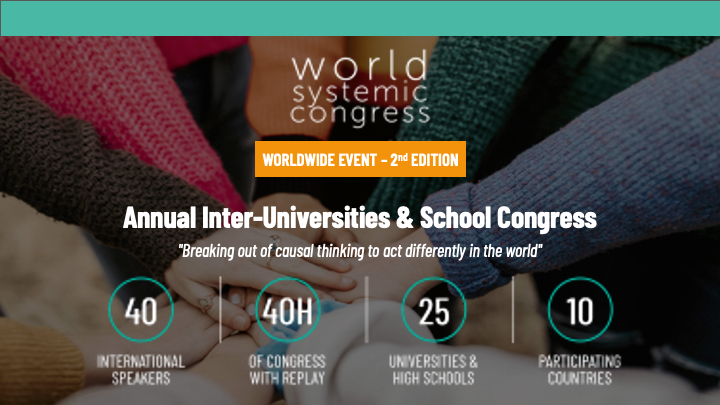
On March 25 & 26, 2025, researchers, academics, philosophers, psychiatrists, sociologists, business leaders, political figures from around the world, meet during an international congress to reflect on a systemic thought with a biopsychosocial vision on social activities Human: mental health, couple, family, education, justice, business, politics, etc. How does the systemic approach make it possible to approach the processes that govern the individual in his relationship to himself, to others and to the world? How does it allow you to get out of a causal way of thinking? How to teach this procedural and complex way of thinking? How to develop the professions of Systemicians, so many new professions of the future, highly qualified and essential to a better relational ecology in society?
On March 26, 12:00-13:30 (LT time), we invite you to participate in the conference and the presentation “Beyond causal thinking with Solution-Focused Approach” by VMU SMF doc. dr. Rytis Pakrosnis.
The conference will bring together international stakeholders from psychology, psychotherapy and anthropology that will share their ideas and their expertise on the application of the approach centered on solutions in the context of work with individuals, couples, couples, couples, couples, couples, couples, couples, couples, couples, couples teams and organizations. Presentations, workshops, examples of cases and discussions will invite participants to explore the approach centered on solutions and highlight the way it can be applied in different contexts to core customers their own way of to be and to act differently in the world.
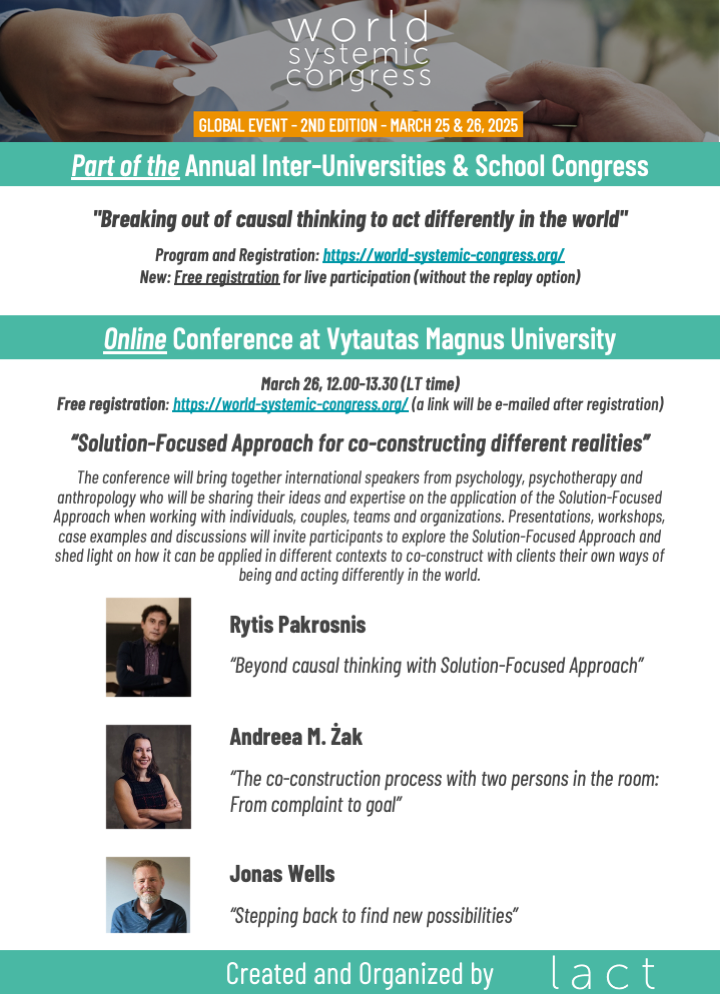
Free registration: https://world-systemic-congress.org/ (link will be sent by email after registration)
Invitation to participate in the conference “Freedom to create 2025”
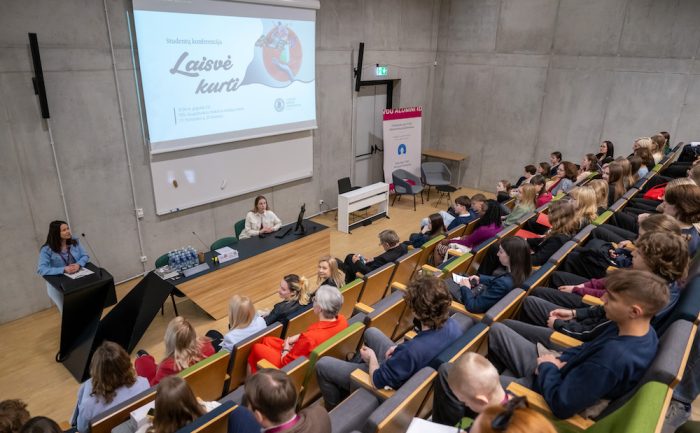
VMU invites you to participate in a student conference “Freedom to Create” which will be held on May 9th, 2025. The conference is dedicated to the 150th anniversary of the birth of the most famous Lithuanian artist and composer, Mikalojus Konstantinas Čiurlionis (1875-1910).
The conference will take place at the VMU Multifunctional Science and Studies Centre (V. Putvinskio g. 23, Kaunas).
Undergraduate, graduate and exchange students of all fields of study are invited to deliver their presentations, present their creative work and/or moderate one of the conference parallel sessions. Presentations can be made individually or in a group with other students.
REGISTRATION FORM and more information.
Registration is open until 31 March.
“The all-time most phenomenal Lithuanian artist, a composer, painter and photographer, whose work comes across as an embodiment of interdisciplinarity and profundity, as a synthesis of avant-garde and heritage and as an inspiration for everyone from the fields of art and humanities to the realms of society, technology and sciences,” says Assoc. Prof. Vilma Bijeikienė, Vice-Rector for Communication at VMU.
The Topics of the Presentations:
- University as a Space for Creation and Art
- Possibilities and Limits of Freedom
- Creativity and Technology
- Solutions for Business and Social Challenges
- A person, Community, and Society in the Context of Changes
- Nature in the Hands of a Scientist
- Languages, Cultural Diversity, and Human Values
- Sustainable Development and Leadership in Education
- Sport and Wellness
- Opportunities and limits to freedom in politics and communication
Keywords of the conference: Artes Liberales, Interdisciplinarity, Creativity, Sustainable Development, Innovation, Multilingualism, Artificial Intelligence (AI)
Types of Presentations and Time:
- Oral presentation (should not exceed 15 min.)
- Poster presentation
- Presentation of creative work (a performance with a presentation not exceeding 15 min., or an exhibition)
Conference Languages: Lithuanian, English and other languages taught at the university.
A presentation summary (200 to 250 words) in Lithuanian or English is required on the registration form.
The summary of the report must include:
- The scientific/practical problem of the report
- The aim of the presentation
- The claims made in the report and the arguments supporting them
- The main results of the research (insights from the report)
- Keywords (3-5 words)
- References (for scientific presentations only)
Authors of selected presentations will be notified by 15 April. Conference programme will be announced by 25 April.
The programme of the conference will be announced here.
The conference is part of a series of events, projects, and initiatives that will take place throughout 2025, dedicated to Vytautas Magnus University’s presidency of the “Transform4Europe” (T4EU) alliance. The alliance, uniting eleven European universities, aims to create joint structures, programs, and platforms for research and innovation, with the main goal of strengthening the T4EU’s future vision, identity, and cooperation.
Students‘ „pulse“ at the Faculty of Social Sciences in 2024 autumn semester
In 2024, the Faculty of Social Sciences launched periodic Studentpulse surveys. These surveys help the administration to get to know its students better and address their challenges more effectively. Meanwhile, students have the opportunity to express their observations or needs throughout the semester. In addition, when students tick certain answer options in the Studentpulse survey, an automatic referral is generated to university departments, centres or faculties that can help students solve the problems they encounter in the study process.
Three Studentpulse surveys were conducted at the Faculty in the autumn semester 2024. So, what did the results of these surveys show?
The best reflection of the mood of the students at the Faculty of Social Sciences in the autumn semester is the overall student satisfaction score, calculated by averaging the responses to the question “I am happy to study at the Faculty of Social Sciences” on a ten-point scale. This score (8.3) and the percentage of students’ responses (‘mood’) can be seen in the figure below.

It should be noted that the satisfaction score varies depending on when the survey was conducted. At the beginning of the autumn semester, the study satisfaction score was 8.6. By contrast, it was 8.3 in the end-of-semester survey, which is most likely due to the increased study load and the pressure of the upcoming exams.
Thus, based on the aggregated results of all three Studentpulse surveys, 61.3% of SMF students who participated in the surveys feel happy studying at the Faculty of Social Sciences of VMU. Students are satisfied with the friendly environment, relations with lecturers, their choice to study in a particular study programme and the quality of studies, opportunities to implement their ideas, and they notice that the Faculty tries to take into account their opinions and needs. 21.9% of the students who took part in the surveys have a neutral attitude towards their experience – they feel good at FSS, but also experience some “mood” swings.
The remaining 16.8% of students surveyed are sceptical. Let’s take a closer look at the attitudes of the latter.
According to Studentpulse surveys, some of the main difficulties expressed by students are the high study load and pace, the uneven distribution of timetables, exams or assignments in some study programmes or subjects, and the fear of losing their state-funded place if they fail to do well in exams. These students’ observations are reflected in a lower score for study-life balance (6.6) and 7.4 score for motivation to study. However, despite the difficulties, the 8.0 score for goal-setting (‘I think that the Faculty of Social Sciences gives me the best chance of succeeding in the exams’) shows that students are confident in their ability to overcome them.
Students‘ suggestions
During the surveys, students expressed their suggestions on how to improve their study experience at the VMU Faculty of Social Sciences. Students would prefer a more even distribution of assignments and midterm exams during the semester, a more flexible approach of lecturers to attendance in some seminars and laboratory sessions, a clearer and more timely presentation of course information and study materials on Moodle, more innovation in teaching, and more hands-on activities. Some concrete suggestions were also made on how to help first-year students navigate the flow of information and how to help to choose a thesis supervisor for senior students.
All the observations and suggestions made in the Studentpulse surveys have been analysed and will be forwarded to the study program committees, the relevant university departments responsible for the organisation of studies and other activities at the university, and the Faculty administration will endeavour to respond to other suggestions where possible.
In response to students’ requests, the Faculty administration and the study program committees continuously initiate a number of changes: the communication tools used to ensure timely and clear dissemination of information are revised and updated; efforts are made to facilitate the lecture timetables for working master students; lecturers are encouraged to use innovative teaching methods in their courses.
We invite students to continue to participate in Studentpulse and other VMU surveys and to actively express their opinions and suggestions. Our goal is to create the best possible study environment and experience at the Faculty of Social Sciences through the joint efforts of the entire Faculty community.
Happy festive season!
During the festive season, let’s not forget each other and give our attention and time to our loved ones
Merry Christmas and a Happy New Year! ✨

VMU Professor Jonas Ruškus awarded the ŠMSM Honorary Badge

On 16 October, Jonas Ruškus, Professor at the Department of Social Work of Vytautas Magnus University (VMU) and former Vice-Chairman of the United Nations Committee on the Rights of Persons with Disabilities, was awarded the Honorary Badge of the Ministry of Education, Science and Sport (ŠMSM).
Prof. Ruškus, one of eight individuals recognised for their outstanding contributions to education, received the Honorary Badge from Minister Radvilė Morkūnaitė-Mikulėnienė. He was honoured for his systematic efforts in shaping and implementing disability policies promoting inclusive opportunities in research, studies, and study-related activities, his expert work at international, national, and regional levels, and for representing Lithuania globally.
Accepting the award, Prof. Ruškus expressed his gratitude to his parents – his mother Irena, a doctor, and his father Jonas, an educator, as well as to Vytautas Magnus University and the community of people with disabilities, without whose contribution, according to him, his activities would not have been noticed and appreciated.
“Being acknowledged and respected is not simply the result of individual competencies. Rather, it is the result of an understanding acquired through civic and community experience that there are groups of people who, because they exist, because of their identity, experience something that no person should have to experience. It is also the result of targeted action for change, in line with internationally agreed goals and human rights standards aimed at protecting groups experiencing systemic inequality. I hold in high regard Article 1 of the Universal Declaration of Human Rights, which declares that all humans are born free and equal in dignity and rights. They are endowed with reason and conscience and should act towards one another in a spirit of brotherhood,” Prof. Ruškus remarked.
In 2014, Prof. Jonas Ruškus became the first Lithuanian representative to the United Nations Committee on the Rights of Persons with Disabilities, and in 2018, he was re-elected for a second term, which lasted until December 2022. He is currently a member of the Lithuanian National Commission for UNESCO, having served as its chair from 2018 to 2021.
Professor Ruškus, who holds a PhD in social sciences, is a recognised expert in the field of disability and actively participates in national and international projects aimed at advocating for the rights of the disabled and other vulnerable groups. His research primarily focuses on social work and education, social inclusion, and human rights. He has lectured at universities in France, Portugal, Belgium, Sweden, Poland, and the USA and is the author and co-author of scientific monographs, studies, and international publications, as well as the author of polemical articles.
Prof. Ruškus has been working at Vytautas Magnus University since 2007 – initially as a Professor in the Department of Social Work and as the Director of the Institute of Social Work, later becoming the Vice-Rector for Studies. From 2011 to 2015, he served as the Dean of the VMU Faculty of Social Sciences.
In 2000, he was awarded a scholarship by the French government, and in 2002 and 2004, he received the Young Scientist Scholarship of the Lithuanian State. He has served as the chairman of the Expert Council at the Centre for Quality Assessment in Higher Education of the Republic of Lithuania, as an expert in various institutions and projects, and as a member of the Education Council of the Republic of Lithuania. Currently, Prof. Ruškus is also the editor-in-chief of the journal “Social Work: Experience and Methods” and a member of the editorial boards of various Lithuanian and international scientific journals.
In 2018, Professor Ruškus was awarded the Cross of the Knight of the Order for Merits to Lithuania. He is also a member of the Kaunas L’Arche Community, the Lithuanian Centre for Human Rights, the “Renkuosi mokyti!” (I Choose to Teach!) programme board, and the “Savarankiškas gyvenimas” (Independent Living) association.
The Honorary Badge is the highest award of the Ministry of Education, Science and Sport, granted to individuals who have made significant contributions to education and science. Candidates for this accolade can be nominated by heads of the Ministry and their subordinate institutions, municipal administrations, non-governmental organisations, and other organisations. The Badge has been awarded since 2007, commemorating the anniversary of the establishment of the Educational Commission of the Kingdom of Poland and the Grand Duchy of Lithuania, which was founded on 14 October 1773. The first Honorary Badge of the Ministry was awarded to Dr. Meilė Lukšienė.




